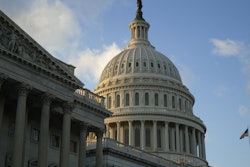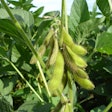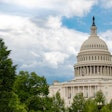President Trump on Thursday announced he plans to slap tens of billions of dollars in tariffs and penalties on imports from China to try to curb what he described as its efforts to steal intellectual property from U.S. companies, according to a report at The Hill.
The president signed a memorandum directing the Office of the U.S. Trade Representative (USTR) and the Treasury Department to launch a broad range of actions against China.
During an event at the White House, Trump said that imposing tariffs on China is “going to make us a much stronger, much richer nation.”
Trump said the tariffs "could be about $60 billion," hours after his own advisers said the number would be closer to $50 billion.
The memorandum is a result of a Section 301 investigation launched in August that found that China’s theft of U.S. intellectual property is costing the U.S. economy billions of dollars.
The decision follows a separate move by Trump to impose new tariffs on imports of steel and aluminum. That decision affected imports of those metals to the United States from around the world and prompted fears of a trade war.
Tom Sleight, U.S. Grains Council (USGC) president, says the council is dismayed at the Trump Administration's new tariffs against China.
"While we are not surprised, we are dismayed," he says. "[The new tariffs] will almost certainly prompt immediate and painful retaliation against U.S. agriculture and have already complicated our global efforts to promote sales of U.S. grains and grain products.
"The farmers and exporters we represent have been here before in our relationship with China," continues Sleight. "Since 2010, we have been adversely impacted by trade policy actions by China against U.S. distiller's dried grains with solubles (DDGS), sorghum, ethanol and corn. We have supported targeted, U.S. government efforts to address these issues but nevertheless remained dedicated to the China market because it holds immense growth potential for U.S. agriculture."
In the near term, USGC says it will continue its work to diversify the markets to which its products are exported, focused on sales that can support prices this crop year. "Based on our recent experience, we are well aware this work will be an uphill battle because our reputation as a reliable supplier has come into question," says Sleight.
In the longer term, U.S. agriculture must have a stable and coherent trade policy to thrive. "The world is watching what our country does next - and markets have long memories," says Sleight. "Agriculture is a positive contributor to the balance of trade, and the international marketplace offers the best available opportunity for growth in the U.S. agriculture sector and the U.S. economy as a whole."
While U.S. Wheat Associates (USW) and the National Association of Wheat Growers (NAWG) understand and support the need to enforce international trade rules, they are concerned about the implications of the Trump Administration’s decision to impose more than $60 billion in tariffs on Chinese goods.
"We agree that unfair Chinese government policies create unnecessary trade distortions that hurt U.S. farmers and other industries," a joint statement from USW and NAWG reads. "Our organizations urged the U.S. government to challenge China’s domestic price support and tariff rate quota compliance that led to cases disputing these policies within the World Trade Organization (WTO). Such cases served notice to China and our trading partners that the United States would lead a legitimate effort to enforce existing trade rules — by following those rules. We believe that it is in the nation’s best interests, and the interests of the wheat farmers we represent, to challenge trade distorting policies to the maximum extent possible within WTO rules.
"It is unfortunate that the well-intentioned decision to challenge other Chinese trade policies has been implemented in a way that violates the rules outlined in Article II of the GATT Agreement," the statement continues. "Recent actions including withdrawal from the Trans-Pacific Partnership and implementing steel and aluminum tariffs on the basis of national security have already undermined U.S. leadership in international trade. Now this action further erodes historical support for rules-based trade policies, even though China will likely bring a case against the tariffs within the WTO dispute settlement process."
The statement added that USW and NAWG fear applying unilateral tariffs could invite retaliation that, as recent history shows, would be aimed at U.S. agricultural products. "This could very well include China throwing up road blocks to U.S. soybeans, wheat, corn and other commodity imports, which would cut into already unsustainable farm incomes," says the statement. "We welcome the administration’s strong support for enforcing trade rules. We only wish it would have challenged China’s state-driven policies in ways that complied with and strengthened existing trade rules."

















